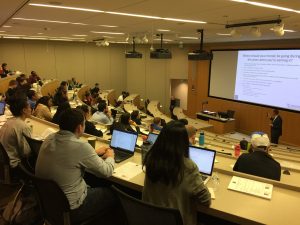July 10, 2018
By Josh Self
No matter how the 2017 Tax Cuts and Jobs Act (TCJA) may alter your tax planning, we’d like to believe one thing will remain the same: With or without a tax write-off, many Americans will still want to give generously to the charities of their choice. After all, financial incentives aren’t usually your main motivation for giving. We give to support the causes we cherish. We give because we’re grateful for the good fortune we’ve enjoyed. We give because generosity is something we value. Good giving feels great – for donor and recipient alike.
That said, a tax break can feel good too, and it may help you give more than you otherwise could. Enter the donor-advised fund (DAF) as a potential tool for continuing to give meaningfully and tax-efficiently under the new tax law.
What’s Changed About Charitable Giving?
To be clear, the TCJA has not eliminated the charitable deduction. You can still take it when you itemize your deductions. But the law has limited or eliminated several other itemized deductions, and it’s roughly doubled the standard deduction (now $12,000 for single and $24,000 for joint filers). With these changes, there will be far fewer times it will make sense to itemize your deductions instead of just taking the now-higher standard allowance, though we believe that with a generally-lower tax burden, many of our clients will have the capacity to give more, not less, due to these tax changes.
This introduces a new incentive to consider batching up your deductible expenses, so they can periodically “count” toward reducing your taxes due – at least in the years you’ve got enough itemized deductions to exceed your standard deduction.
For example, if you usually donate $8,000 annually to charity, you could instead donate $40,000 once every five years. Combined with other deductibles, you might then be able to take a nice tax write-off that year, which may generate (or be generated by) other tax-planning possibilities.
What Can a DAF Do for You?
DAFs are not new; they’ve been around since the 1930s. But they’ve been garnering more attention as a potentially appropriate tax-planning tool under the TCJA. Here’s how they work:
- Make a sizeable donation to a DAF. Donating to a DAF, which acts like a “charitable bank,” is one way to batch up your deductions for tax-wise giving. But remember: DAF contributions are irrevocable. You cannot change your mind and later reclaim the funds.
- Deduct the full amount in the year you fund the DAF. DAFs are established by nonprofit sponsoring organizations, so your entire contribution is available for the maximum allowable deduction in the year you make it. Plus, once you’ve funded a DAF, the sponsor typically invests the assets, and any returns they earn are tax-free. This can give your initial donation more giving-power over time.
- Participate in granting DAF assets to your charities of choice. Over time, and as the name “donor-advised fund” suggests, you get to advise the DAF’s sponsoring organization on when to grant assets, and where those grants will go.
Thus, donating through a DAF may be preferred if you want to make a relatively sizeable donation for tax-planning or other purposes; you’d like to retain a say over what happens next to those assets; and you’re not yet ready to allocate all the money to your favorite causes.
Another common reason people turn to a DAF is to donate appreciated assets, such as real estate or stocks in kind (without selling them first), when your intended recipients can only accept cash/liquid donations. The American Endowment Foundation offers this 2015 “Donor Advised Fund Summary for Donors,” with additional reasons a DAF may appeal – with or without its newest potential tax benefits.
Beyond DAFs
A DAF isn’t for everyone. Along the spectrum of charitable giving choices, they’re relatively easy and affordable to establish, while still offering some of the benefits of a planned giving vehicle. As such, they fall somewhere between simply writing a check, versus taking on the time, costs and complexities of a charitable remainder trust, charitable lead trust, or private foundation. If it is appropriate for your situation, we are happy to discuss planned giving vehicles with you too.
How Do You Differentiate DAFs?
If you decide a DAF would be useful to your cause, and might be a helpful part of your financial plan, the next step is to select an organization to sponsor your contribution. Sponsors typically fall into three types:
- Public charities established by financial providers, like Fidelity, Schwab and Vanguard
- Independent national organizations, like the American Endowment Foundation and National Philanthropic Trust
- “Single issue” entities, like religious, educational or emergency aid organizations
Within and among these categories, DAFs are not entirely interchangeable. Whether you’re being guided by a professional advisor or you’re managing the selection process on your own, it’s worth doing some due diligence before you fund a DAF. Here are some key considerations:
Minimums – Different DAFs have different minimums for opening an account. For example, one sponsor may require $5,000 to get started, while another may have a higher threshold.
Fees – As with any investment account, expect administration fees. Just make sure they’re fair and transparent, so they don’t eat up all the benefits of having a DAF to begin with.
Acceptable Assets – Most DAFs will let you donate cash as well as stocks. Some may also accept other types of assets, such as real estate, private equity or insurance.
Grant-Giving Policies – Some grant-giving policies are more flexible than others. For example, single-entity organizations may require that a percentage of your grants go to their cause, or only to local or certain kinds of causes. Some may be more specific than others on the minimum size and/or maximum frequency of your grant requests. Some have simplified the grant-making process through online automation; others have not.
Investment Policies – DAF assets are typically invested in the market, so they can grow tax-free over time. But some investments are far more advisable than others for building long-term giving power! How much say will you have on investment selections? If you’re already working with a wealth advisor, it can make good sense to choose a DAF that lets your advisor manage these account assets in a prudent, fiduciary manner. PLC Wealth employs an evidence-based investment strategy for all our managed assets.
Transfer and Liquidation Policies – What happens to your DAF account when you die? Some sponsors allow you to name successors if you’d like to continue the account in perpetuity. Some allow you to name charitable organizations as beneficiaries. Some have a formula for distributing assets to past grant recipients. Some will roll the assets into their own endowment. (Most will at least do this as a last resort if there are no successors or past grant recipients.) Also, what if you decide you’d like to transfer your DAF to a different sponsoring organization during your lifetime? Find out if the organization you have in mind permits it.
Deciding on Your Definitive DAF
Selecting an ideal DAF sponsor for your tax planning and charitable intent usually involves a process of elimination. To narrow the field, decide which DAF features matter the most to you, and which ones may be deal breakers.
If you’re working with a wealth advisor such as PLC Wealth Management, we hope you’ll lean on us to help you make a final selection, and meld it into your greater personal and financial goals. As Wharton Professor and “Give and Take” author Adam Grant has observed, “The most meaningful way to succeed is to help others succeed.” That’s one reason we’re here: to help you successfully incorporate the things that last – like generosity – into your lifestyle.







